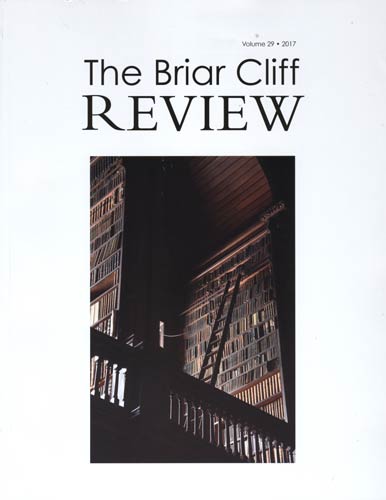The Briar Cliff Review – 2017
The Briar Cliff Review, a publication of Briar Cliff University in Sioux City Iowa, has published its 29th issue, and for 29 years it has held to its mission “to discover and support new and mid-career writers and artists, to keep literature and art alive for future generations.” This it has done in a beautiful issue of art, fiction, nonfiction, and poetry that serves readers finely-crafted portions of each genre. The annual publication is worth the wait.
The Briar Cliff Review, a publication of Briar Cliff University in Sioux City Iowa, has published its 29th issue, and for 29 years it has held to its mission “to discover and support new and mid-career writers and artists, to keep literature and art alive for future generations.” This it has done in a beautiful issue of art, fiction, nonfiction, and poetry that serves readers finely-crafted portions of each genre. The annual publication is worth the wait.
Because there is so much to feast on in this issue, I start with art as the appetizer, knowing that I may fill up on the rich offerings. From oil paintings to photographs of stoneware, places, and objects, the variety serves the issue well and the visual sensations are stunning. Michael Hill’s photographs of wood-fired stoneware include “From the Torso Series” and “Still Life,” while Gerry Punt presents pieces of salt-fired stoneware. The photographs are beautiful representations of skilled work by these artists, and a number of photographs in the issue are truly mesmerizing. Roger Camp’s “Fallen Angels #13” arrests with color and shape, and Dolie Thompson’s “Plenty 2” uses shapes and reflections to draw attention. Paintings and photographs throughout the issue are reasons for pause and contemplation.
No less a feast awaits in the poetry of this issue, as the poetic bounty is plentiful. Lisa Meckel presents a compact and surprisingly peaceful observation in “Riot in Your Garden.” Even the “flurry of wings . . . on this hummingbird morning” evokes an all-is-right-with-the-world kind of mood. Regina Marie’s “The Imposition of Salt” sets a more frantic tone as the speaker is “trying to remember what is the proper use of surrender and what is the use of salt?” in the midst of observations of death and tragedy. Philip Dacey’s “Corduroy” considers “The politics / of fiber” in a seven-part poem of perception and meaning. R. Steve Benson shares “Symphony at a Conoco” and the images are unexpected, undaunted, and a bit unnerving. This poem shares an image of the gas pump as “a rubber-armed robot with a gun’s / barrel in its ear hole.” The elegant quatrains narrate the speaker’s brief moments filling up before heading on his way. These and many other beautifully crafted poems add to the literary collection in this issue of the review.
Three award winners appear at the front of the issue, and they aptly introduce the quality of the writing that follows. In the three categories of fiction, poetry, and nonfiction, these pieces represent the acme of creativity and craft. The two prose pieces work to alter perceptions of parenthood and family with a new look at Superman’s early childhood in “The Last Sun of Kansas” by Daniel Paul and an original holiday narrative in “Christmas in the Bitch’s Dollhouse” by Lisa Lanser Rose. Each of these works sheds light on difficult situations. The speaker in Rose’s narrative tells of her “first Christmas without a man,” when she “bought the biggest Christmas tree” of her life. Paul’s story is from the point of view of Clark K.’s adoptive mother who explains her tips for raising an alien baby, one of which is the following:
When your child begins levitating in his sleep, do not have a panic attack imagining him floating out of reach into the sky like a lost balloon; instead, rock him gently side to side in the air, as if in an invisible bassinet.
The story illuminates the difficulties of parenting any child with special needs within the familiar genre of the superhero’s beginnings.
The winning poem is by Jude Nutter and is in memory of his father; the speaker tells us that “darkness is a door / standing ajar. And from this point on, the way/ unexplored, uncharted, unlit.” Searching in a cave brings up thoughts of earthly beginnings and endings in a poem that follows a line of thought toward a question. These winning works indicate a path strewn with eloquent literary riches.
There is so much for readers to delve into in this issue of The Briar Cliff Review. The feast is bountiful and every bite will be one to savor, indulging in each elegant course as it comes.
[www.bcreview.org]





